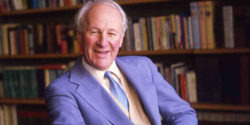
John R. W. Stott (1921-2011)
By Matthew Barrett
Just yesterday the beloved, evangelical leader, John Stott, went to be with the Lord Jesus Christ. Stott was 90 years old and considered by many to be one of the most important evangelicals of the 20th century. Stott studied at Trinity College, Ridley Hall Theological College, and the University of Cambridge. He served as curate at All Souls (1945-50) and then as rector (1950-75), eventually receiving the position of Rector Emeritus (1975). Stott was also a chaplain to the Queen (1959-1991). He is known for founding the Langham Partnership International (1974). He was also the primary author of the Lausanne Covenant (1974). Stott, who remained single all of his life, devoted himself to writing and became a prolific author still read by millions today.
I remember reading John Stott’s book The Cross of Christ (first published in 1986) for the very first time. The Cross of Christ was perhaps the first book, and maybe still the most important, that influenced my understanding and affirmation of penal substitutionary atonement. Today it continues to be a text-book in many Christian colleges and seminaries.
But perhaps Stott’s best-selling book, having sold over 2.5 million copies, was Basic Christianity (1958). Stott is also well-known for Between Two Worlds (1982). Many other books could be mentioned but it is important to recognize that Stott also wrote numerous commentaries on various books of the Bible in the Bible Speaks Today series.
The Langham Partnership has released a video and a website in honor of Stott. They have also put together a short biography of Stott that you may find very helpful if you do not already know who Stott was or what he accomplished in his lifetime. The biography begins,
John Stott was born in London in 1921 to Sir Arnold and Lady Stott. He was educated at Rugby School, where he became head boy, and Trinity College Cambridge. At Trinity he earned a double first in French and theology, and was elected a senior scholar.
John Stott trained for the pastorate at Ridley Hall, Cambridge. He was awarded a Lambeth doctorate in divinity (DD) in 1983 and has honorary doctorates from universities in America, Britain, and Canada.
He was listed in Time Magazine’s “100 Most Influential People” (April, 2005) and was named in the Queen’s New Years Honours list as Commander of the Order of the British Empire (CBE) on December 31, 2005. . .
You can continue reading the rest here. I will leave you with words from the pen of Stott himself:
“As a typical adolescent, I was aware of two things about myself, though doubtless I could not have articulated them in these terms then. First, if there was a God, I was estranged from him. I tried to find him, but he seemed to be enveloped in a fog I could not penetrate. Secondly, I was defeated. I knew the kind of person I was, and also the kind of person I longed to be. Between the ideal and the reality there was a great gulf fixed. I had high ideals but a weak will. . . . [W]hat brought me to Christ was this sense of defeat and of estrangement, and the astonishing news that the historic Christ offered to meet the very needs of which I was conscious.”
Matthew Barrett (Ph.D., The Southern Baptist Theological Seminary) is the founder and executive editor of Credo Magazine. Barrett has contributed book reviews and articles to various academic journals and he also writes at Blogmatics. He is married to Elizabeth and they have two daughters, Cassandra and Georgia. He is a member of Clifton Baptist Church in Louisville, KY.

